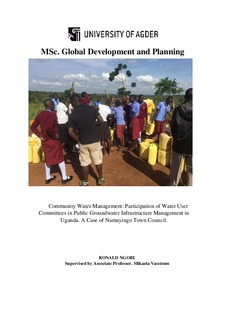| dc.description.abstract | Water is a critical natural resource not only to life and natural ecosystem functioning, but also, for economic and social development. The global recognition of the role of water in development dates back in 1977 with the United Nations Water Conference in Mar del Plata. Since then, water has remained pivotal in the development of nations. Specifically, groundwater is critical to sustainable development, meeting the global water needs of over 1.5 million people daily. However, it is rarely well managed. This study therefore examined community water management, and analysed the participation of water user committees in public groundwater infrastructure management in relation to functional sustainability in Namayingo Town Council. Community water management was adopted to involve communities in groundwater development and management, and enhance the sustainability of rural water systems in Uganda. Yet, non-functionality of water sources upsurges, and the Ministry of Water and Environment continues to offer technical solutions. However, it is important to analyse the social and community factors, maintenance, and water sector policy and institutional frameworks that impact on the participation of water user committees and functional sustainability. For empirical evidence, empirical investigation was based on a case study design taking a qualitative approach. Findings revealed that community water management remains rhetoric in Namayingo Town Council. In policy documents, the model promises sustainability. However, non-functionality of water facilities reveals the inability of the model to address sustainability. There was lack of participation of water user committees in the initial stages of groundwater infrastructure development. Further, the practice of the national water sector policies at community level exacerbated by inadequate institutional support did not support the institutional and economic structures of water user committees. Hence, participation and inadequate social capital were key in understanding the lack of functionality sustainability of groundwater facilities in Namayingo Town Council, Uganda | nb_NO |

